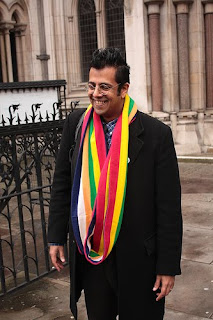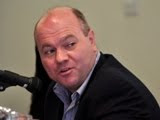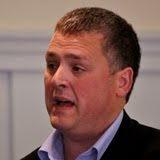Jeremy Webb lives the dual life of the specialist journalist. He immerses himself in the new frontiers of scientific discovery and the fast changing world of publishing, he must be an expert in both. As Editor in Chief, he presides over not only the biggest selling weekly science magazine in the world, but its hugely successful sister website too.

Webb has worked at New Scientist for 16 years and he clearly enjoys it. “On a good day, my job is to travel round the world and talk to some of the brightest and most innovative thinkers in the world, now what's not to like about that? It's just a pleasure to do all the time, I meet such exciting, bright, stimulating, creative people. And the things they discover about the universe are just mind blowing.”
It was that scientific curiosity that started Webb on his path to success, he earned a degree in physics and solid-state electronics from the University of Exeter. “Studying physics is kind of like trying to get to the basics of how the universe works,” He recalls. “I've always found it intriguing and the world is a weird place and the universe is a strange place. I love finding out just how strange it all is.”
Do you have to be a scientist before you can write about it? “You can teach people who've studied science how to write but it's much more difficult to teach a good writer about science,” Webb replies. “That's because you pick it up over a long period of time, like osmosis. If you want to be a science writer, my advice would be go and go get a science degree.”
“There is an increasing understanding that science is really important. It effects every aspect of daily living, whether it's the ceramic that goes in to the hair straighteners you use in the morning to whether or not a woman can have a child when she's 55 or even the car you drive to work. Science effects the way we think about the world, it effects the world itself, it causes problems for the world, it can also provide the solutions to those problems.”
From university, he went straight into the BBC, working in their sound department (“You needed to be a specialist with razor blades and tape...”) before making the leap back to science as a reporter for a medical magazine. At New Scientist he's worked as deputy news editor and features editor before reaching the lofty heights of the top job.
“Of course it can be stressful, you always have ideas flying around in your mind and it's very difficult to calm your brain down long enough to sort things out. I can wake up at three in the morning, worrying about something or other.”
Webb attributes the success of the New Scientist website to simply being first off the bat. “We learned an awful lot about the web and how it could benefit us long long before any other publishing companies got interested. So I think just from being there fist was important. But the other thing is that New Scientist is the biggest selling weekly science magazine in the world. Nothing else can touch us, we were first in and we've got an established position.” A consistent range of innovative and well written science articles on the site have helped cement that position.
But not everything is free, the newest content can still only be found in the magazine, Webb is unapologetic. “Now I know that web culture doesn't approve of that so much but I think there's been a big understanding around the world that it's needed, certainly we've seen the publishing industry collapse because no one's buying newspapers or magazines any longer. We want to head that off before it happens in this country.”
What would Webb say to the aspiring journalism student that wants his job? “If you're serious about becoming a writer, the first thing is to get yourself published because there is so much competition these days. When people like myself are recruiting new writers we ask first how serious is this person? It doesn't matter if they've been published in a university paper or university website or somewhere else, it doesn't matter.
“Get published anywhere, anywhere just so you can send your cuttings in to an editor just so you can say look, I'm serious about being a journalist, here is what I've done so far and you can tell from these clips that I'm really keen and eager to get myself published. And that's the most important thing of all.”
When asked what one piece of advice he would give to Winchester students, Webb paused. “There is one thing... We have the possibility of an all singing all dancing form of journalism.
“There is going to be room for a type of journalist who can also programme, by that I mean who can use HTML 5, possibly flash, certainly be able to edit video. There is clearly a growing need for this kind of people and at the moment they're very difficult to find. I would say that there is a new area of journalism that's arising from that.
“The really tooled up journalist will have all these skills under their belt. I don't want to diminish the fact that having a nose for a story is really important, being able to write and interview people. Being able to write about your story in an engaging and enticing way is really important. But all these other skills will become valuable in the future.”
So the industry is changing and New Scientist will change with it. But Webb argues that the traditional magazine is far from dead.“We know that there are a lot of people who aren't adverse to sitting at a computer and reading long articles but we also know that a lot of people sit at computers all day long and when they get home they want another way to read.
“Now whether that's going to be a magazine made of paper or a magazine on an i-pad I can't tell you. But it's this idea that you can have a design with a magazine, you can see graphs and photographs in glorious technicolour. At the moment it's difficult to do that in an easy portable form with electronic media. Is the future all online or all in magazines? I don't have a crystal ball large enough to tell you.”





